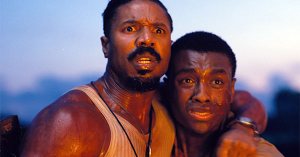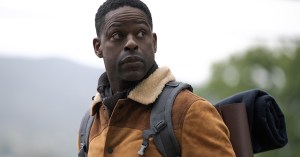Interview: Darfur Now Producer Cathy Schulman On Getting Involved
We talk to the producer about her new documentary and the troubled region.
 The enormity of the conflict in Darfur is such that many
The enormity of the conflict in Darfur is such that many
have been numbed by its complexity and seemingly endless violence. It’s a
situation that the makers of the new documentary,
Darfur Now (featuring
Don Cheadle and expanding into theaters this Friday), hope to help correct.
In short, the conflict involves several loosely-affiliated
rebel groups that have been brutally suppressed by the Sudanese government and
proxy militias. Though it’s hard to get accurate figures, it’s likely that
nearly 450,000 people have been died and more than two million displaced by the
fighting.
Rotten Tomatoes spoke with Oscar-winning producer
Cathy Schulman, one of the producers of the project, about the
difficulties in making the film, the delicate balance between activism and
entertainment in cinema, and how to mobilize to end the violence.
What do you hope the response to Darfur Now will
be?
Cathy Schulman: First and foremost, I hope it
contributes to making a difference in the crisis itself. The reason for making
it so quickly and getting it into the marketplace so quickly was in the hope it
could inform people and make some noise about the film. That’s the most
important thing. That’s intimately connected to what its theatrical life is too.
I want the movie to perform and I want the people to love it but it was always
done as an expression of activism. I don’t want people to think it’s medicinal
either, I guess I should say that.
How did you get involved in the film?
CS: Don Cheadle and I had obviously worked really
hard together on Crash and we won the Academy Award. If there was ever a
time to use our fame and momentary fortune to give back then was the time. When
you get an Academy Award, you feel like you’ve got a little gold star on your
forehead and now you can really get something interesting done. Don radicalized
me on the issue of Darfur, which happened during the structuring of Crash.
I was sitting in a meeting listening to a narrative pitch, a story about a
soldier who goes to Darfur, and it came to me like a rocket. I thought, “Truth
is stranger than fiction.” How could we possibly do a fictional film about an
issue people aren’t even aware of in real life? And I knew what we’d do was make
a documentary about this subject matter.
In talking to various agents about this, I was introduced
to [Darfur director] Ted Braun, who had come up with this notion for Darfur Now. I thought
his way of approaching the material was spot on because he wanted to make a
movie that was about making a difference as opposed to doing an expose, a movie
that had hope. For Don [Cheadle] and I, [it] was so important to us to answer a
certain question. In our own lives we ask, "Why, when we hear tragedies
happening on other sides of the world, do people say, ‘Well, that’s too bad but
it’s so far away and so complicated, what can possibly I do?'” So the question
was can we make a film that brings the conflict closer? Make it more familiar to
the people and offer a sense of sameness? So this was an interesting way to go.
Your film didn’t get all that far into the minutia of
this very complicated conflict; it was more about what you can do.
CS: That was very much our goal. In regard to the
humanitarian crisis nationally and internationally, the best thing you can do is
gather voices and make a lot of noise at the people who can help make a
difference. It’s crucially important with human interest and humanitarian issues
like this that people get loud. Get educated, get loud, and say “No more.” And
that’s when you can get mobilized. Believe me, we can make a difference in
Darfur. There they have a situation that is primarily driven by a portion of a
government that has allowed this and we can change all that by putting these war
criminals behind bars, first and foremost.
In the film, you feature people like Sam Brownback and
Hillary Clinton, which shows that people on both sides of the political aisle
agree on the issue. Yet there hasn’t been any sort of critical mass movement.
What’s the obstacle there?
CS: I think it’s the remote nature of the conflict.
We live in a touchy-feely world where the closer the problem the more capable we
are of coping — if at all. Not to put words in Don’s mouth, but he always says,
“There’s something about West Africa. Like, if it’s there, it’s an ‘African
problem.’" Like, that’s the continent where that stuff happens. People don’t
take the time [to explore] and otherwise people have grown desensitized to
violence. Which is one of the reasons we decided not to make a film where every
other frame you’re seeing a shot of a body or atrocity of some sort or another.
As you saw in the film, we only have one shot of violence, which was a very
conscious decision. For whatever reason, seeing so much news or being
overwhelmed with violent imagery all the time, the reaction isn’t “God, what do
I do to stop that from happening?” The reaction seems to be to go cold. I think
you put up your emotional barriers as an individual and think, “I can’t cope
with that.” I think that’s happening on a macro level. How would you read about
2.5 million displaced people and over 200,000 people murdered in this violent
way and not do something? We keep reading stuff like that in the world we live.
You witnessed these things firsthand?
CS: No, I personally did not go to Darfur. We sent a
crew of five people.
So your end was insurance and logistics.
CS: Yeah, gosh. It’s taken so much to get it mounted
and keep everybody safe. [It was] really hard to shoot there. Usually the
problem with shooting in a foreign place is you’re trying to figure out the
infrastructure and trying to deal with the lab. With this film, we had to deal
with keeping our film from getting stolen, how [we were] going to house our crew
because we can’t find hotel rooms because of the embargo, how [we were] going to
deal with communications if we can’t bring GPSes. It was crazy stuff.
Were you constantly concerned with the safety of the
crew?
CS: The day they got on that plane to come back and
they called me from the London airport — they’d gone from Khartoum to London —
I’ve never felt a bigger stress reliever in my life. I had a backache for weeks
that went away that day. I realized I was stressing. And the phone calls were
erratic and in the middle of the night and it did make me anxious the whole
time. I hated it when I couldn’t talk to them for days on end because, you know,
they couldn’t get a signal or something. That would happen [and] it was
terrible.
You’ve worked on a lot of films that have social
messages. How do you balance the message and your duty to the audience?
CS: The most important thing is that I apply the
same rules to a documentary or a social action film that I do to a narrative,
fictional film for general marketing. We cannot be boring, and we have to be
involving for 90 minutes. We have to be self-distinguishing and worthy of
conversation so there’s something people can talk about and so that the word of
mouth can live and people can say, "This is something worth seeing," even if the
subject matter might be more serious or politically oriented or socially
focused. The truth is all those things are to be applied to any film I work on.
I know you went through some tough times producing Crash.
Did the Oscar make it all worth it in the end?
CS: I look back on Crash fondly because the
shooting of that movie and the post-production was the greatest collaboration of
my career. I loved everyone I worked with and
Paul [Haggis] and I had the best
working experience. Secondly, there’s nothing bad about winning an Oscar, but
all that is overshadowed by the financial debacle. The thing I’m sad about is
instead of it being shared celebration it’s turned into this unnecessary
economic battle. (A suit filed by Shulman’s former business partner
Bob Yari
seeking production credit on Crash was dismissed in late 2006.)
Did it change your perspective? Do you get onto projects
and think, "This might have a shot because my last one did?"
CS: [Laughs.] You mean an Oscar shot? It’s funny.
One of the most amazing things about winning an Oscar is that the minute you win
one there’s only one the thing you want. And that’s to win another one. It’s
like that whole thing your mother tells you: be careful about a goal because
once you get there…
I also understand a little more of what it takes to go
through that kind of a race. You can’t start a film thinking about awards or
accolades. You can only start a film thinking about what it is you care to
communicate or think will be interesting to audiences. The rest has to be gravy.
Darfur Now is in select theaters now.








